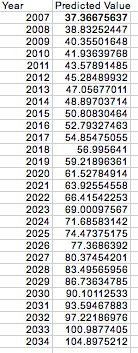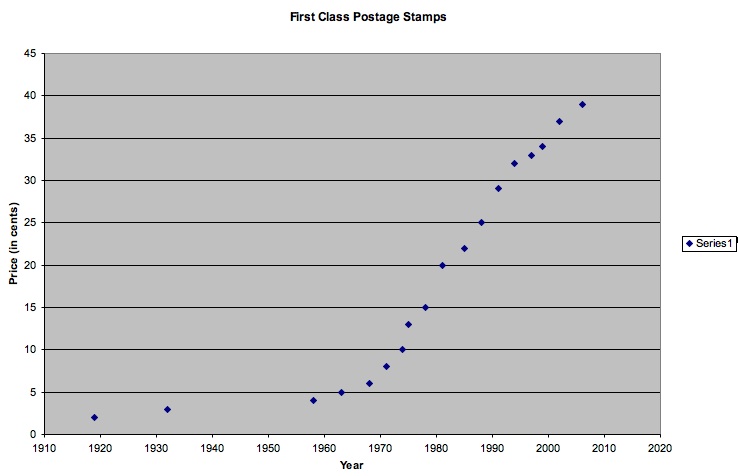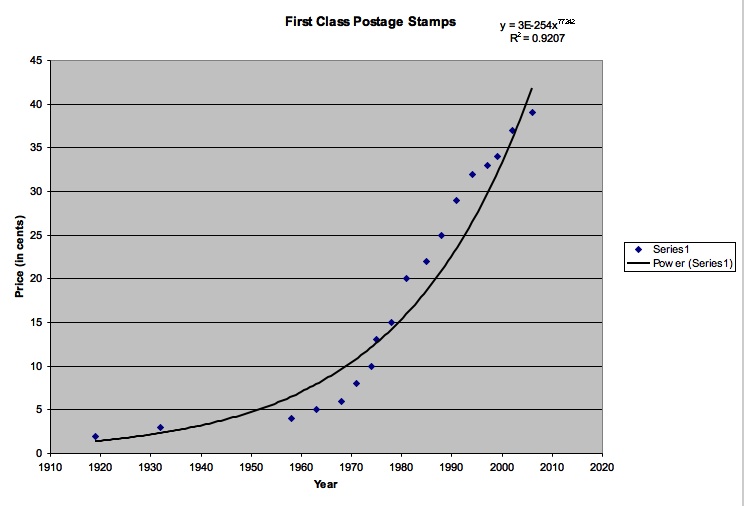Final Project
Postage Stamp Problem
Consider the Stamp Problem in
Assignment 12. Update the data to include the price increases for a
first class letter through January 2006 -- when the price will become
39 cents. (Recent increases were 33 cents in 1997, 34 cents in 1999,
and 37 cents in 2002.) Prepare a write-up and use your analysis to
answer the questions anew:
When will the cost of a first class postage stamp reach $1.00?
When will the cost be 74 cents?
How soon should we expect the next increase?
In 1996, the analysis of stamp data historically seemed to show that
the postage doubled every 10 years approximately. The cost in 2006
would seem to argue that pattern is no longer valid. Is there evidence
to show a change in the growth pattern? Or, was the 'doubles every ten
years' just a bad model?
From the Postage Stamp
Problem in Assignment 12 we were given the following information in the
form of a spreadsheet.
Using Excel, we can create a
scatter plot to analyze this information. The scatter plot below
shows Year plotted on the x axis and Postage Stamp Price (in cents)
plotted on the y axis. The relationship between Year and Price
appears to be an exponential or power function.
Next, we'll create a trendline to
explore this relationship. The trendline we've created appears to
fit the data. We can use Excel to calculate the function and the
R² value. R² measures how closely the trendline fits
the scatter plot. The closer this number is to one, the better
the line fits the data. In this case, R² has a value of
.9207.
When will the cost of a first
class postage stamp reach $1.00?
If we use the equation of the
trendline to predict future stamp prices, we can look at the change in
price over the next few years.

According to the trendline equation, the cost of a first class postage
stamp will reach $1 in 2032. Notice that at the beginning of year
2033, postage stamps are predicted to cost 1.99. This means
postage stamps are predicted to cost $1 in year 2032.
When will the cost be 74
cents?
According to the trendline
equation, the cost of a first class postage stamp will reach 74 cents
in 2024. (Again, postage stamps will already cost 74 cents at the
beginning of year 2025)
How soon should we expect the next
increase?
The following table shows number of years between increases. If
we look at the length of time between increases prior to 1980, we can
see that the average length of time between increases is approximately
3 years. We should then expect the next increase in 2009 at which
time the price will be 41 cents.

In 1996, the analysis of
stamp data historically seemed to show that the postage doubled every
10 years approximately. The cost in 2006 would seem to argue that
pattern is no longer valid. Is there evidence to show a change in the
growth pattern? Or, was the 'doubles every ten years' just a bad model?
I would argue that the pattern, "the price doubles every 10 years" was
a bad model. If we look at the trendline, we can see that the
relationship between year and price is increasing exponentially.
When postage stamp price was a relatively small number, "doubling every
ten years" may have described the data. However, the trendline
shows quite clearly that after 1996 this relationship no longer holds.
Return
to my homepage





